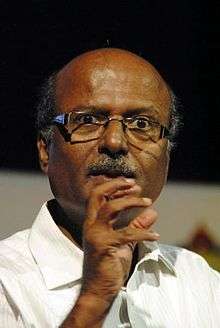Valerian Rodrigues

Valerian Rodrigues (born 1949) is an Indian political scientist. He is known for his seminal work on Babasaheb Ambedkar,[1] and for his formulations of themes in Modern Indian Political Thought.[2][3] He has made substantial contributions to the debate on the working of the Indian Parliament,[4] constitutionalism in India,[5] and agrarian politics in India.[6] As a Professor at the Centre for Political Studies at Jawaharlal Nehru University (JNU), New Delhi,[7] he was popular for his lectures on Indian and South Asian Political Thought, and critically reading the same through political concepts of modernity, secularism and nationalism. Before joining JNU, Rodrigues taught at the Department of Political Science at Mangalore University, Karnataka, India.[8] He is currently a National Fellow with the Indian Council for Social Science Research (ICSSR).[9]
Early life
Rodrigues was born in Loretto, Bantwal Taluk, Karnataka.[10] He received his MA from the University of Poona and his MPhil and PhD from Jawaharlal Nehru University, New Delhi. As a political activist in the 1970s, he was influential in securing land titles for landless farmers and farm workers of Coastal Karnataka under the Karnataka Land Reforms (Amendment) Act, 1974 [11]
Academic career
After receiving his MA from the University of Poona, Rodrigues first taught at Sri Dharmasthala Manjunatheshwara College, Ujire, Karnataka. He received his PhD from the Centre for Political Studies, JNU, India, in 1986, and was Agatha Harrison Fellow at St. Anthony’s College, Oxford from 1989-1991.[12] He was also a senior fellow at the Indian Institute of Advanced Studies, Shimla, from 1999-2001.[13] Rodrigues taught Political Science at Mangalore University, Karnataka from 1982 to 2003 before moving to Jawaharlal Nehru University, New Delhi, where he was Professor of Political Science from 2003 to 2015.
He has been the ICCR (Indian Council of Cultural Relations) Visiting Professor at the University of Erfurt, Visiting Professor at the University of Wurzburg and Fellow at the Max Weber Center for Advanced Studies, Erfurt, Germany.[14][15]
Selected Works
- [https://books.google.co.in/books/about/Dalit_movements_and_the_meanings_of_labo.html?id=zGPtAAAAMAAJ&redir_esc=y "Making a Tradition Critical: Ambedkar's Reading of Buddhism", in Peter Robb, ed., Dalit Movements and the Meanings of Labour in India, [[OUP]], 1993]]
- B.R.Ambedkar: Sources and Traditions, Osmania University, 1997
- [https://books.google.co.in/books/about/The_Essential_Writings_of_B_R_Ambedkar.html?id=pmcMAQAAMAAJ The Essential Writings of B.R Ambedkar ([[Oxford University Press]] 2002)]]
- "Dalit-Bahujan Discourse in Modern India" in V.R. Mehta and Thomas Pantham eds. Political Thought in modern India, Sage, 2005
- "Untouchability, Filth and the Public Domain", in Gopal Guru eds.,Humiliation: Claims and Context, OUP, 2009
- [https://books.google.co.in/books/about/The_Indian_Parliament.html?id=Gtz2RAAACAAJ&redir_esc=y The Indian Parliament: A Democracy at Work ([[Oxford University Press]] 2010)]]
- Reading Texts and Traditions: The Ambedkar-Gandhi Debate, Economic and Political Weekly, 2011
- "Justice as the Lens: Interrogating Rawls through Sen and Ambedkar", Indian Journal of Human Development, Jan-June 2011
- In Search of an Anchor: Muslim Thought in Modern India, Economic and Political Weekly, 2011
- "Political Power and Democratic Enablement: Devraj Urs and Lower Caste Mobilisation in Karnataka", Economic and Political Weekly, 2014
References
- ↑ Rodrigues, Valerian (2003). The Essential Writings of B.R.Ambedkar. New Delhi: Oxford University Press.
- ↑ Rodrigues, Valerian (2011). "Reading Texts and Traditions: The Ambedkar-Gandhi Debate". Economic and Political Weekly.
- ↑ Rodrigues, Valerian (2011). "In Search of an Anchor: Muslim Thought in Modern India". Economic and Political Weekly.
- ↑ Rodrigues, Valerian (2011). The Indian Parliament: A Democracy at Work. New Delhi: Oxford University Press.
- ↑ Bhargava, Rajeev (2008). Politics and Ethics of the Indian Constitution. Oxford University Press.
- ↑ "Devaraj Urs and Lower Caste Mobilization in Karnataka".
- ↑ "JNU Faculty Directory".
- ↑ "Vice-President Ansari Releases Book by Mangalore's Prof. Rodrigues".
- ↑ "Reclaiming a Space for the Catholic Church".
- ↑ "Vice President Ansari Releases Book by Mangalore's Prof. Rodrigues".
- ↑ "Devaraj Urs and Lower Caste Mobilization in Karnataka".
- ↑ Garimella, Subramanium (2001). "Untouched..By Change".
- ↑ "IIAS Fellow Archive".
- ↑ "Democracy and Religious Minorities in India" (PDF).
- ↑ "The Analysis of the 2014 Lok Sabha Elections".